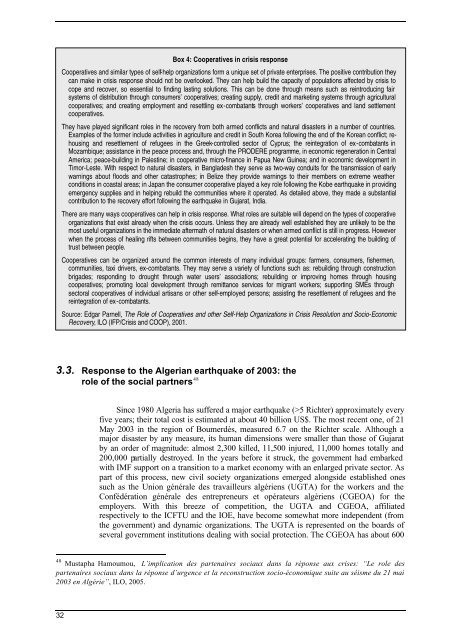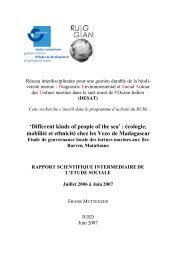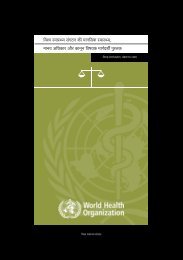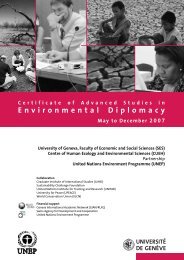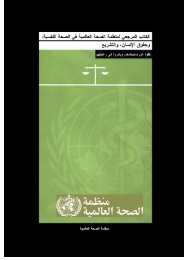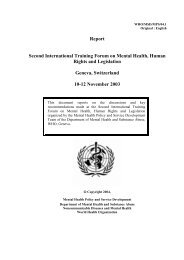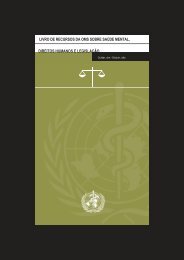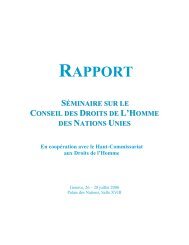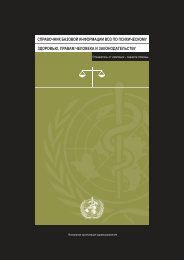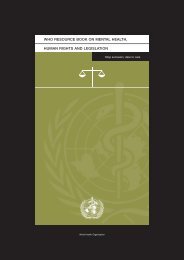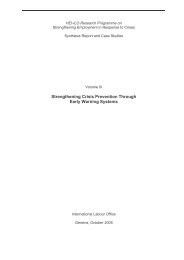Volume 1 Cedric - revised luca Final - RUIG-GIAN
Volume 1 Cedric - revised luca Final - RUIG-GIAN
Volume 1 Cedric - revised luca Final - RUIG-GIAN
Create successful ePaper yourself
Turn your PDF publications into a flip-book with our unique Google optimized e-Paper software.
Box 4: Cooperatives in crisis responseCooperatives and similar types of self-help organizations form a unique set of private enterprises. The positive contribution theycan make in crisis response should not be overlooked. They can help build the capacity of populations affected by crisis tocope and recover, so essential to finding lasting solutions. This can be done through means such as reintroducing fairsystems of distribution through consumers’ cooperatives; creating supply, credit and marketing systems through agriculturalcooperatives; and creating employment and resettling ex-combatants through workers’ cooperatives and land settlementcooperatives.They have played significant roles in the recovery from both armed conflicts and natural disasters in a number of countries.Examples of the former include activities in agriculture and credit in South Korea following the end of the Korean conflict; rehousingand resettlement of refugees in the Greek-controlled sector of Cyprus; the reintegration of ex-combatants inMozambique; assistance in the peace process and, through the PRODERE programme, in economic regeneration in CentralAmerica; peace-building in Palestine; in cooperative micro-finance in Papua New Guinea; and in economic development inTimor-Leste. With respect to natural disasters, in Bangladesh they serve as two-way conduits for the transmission of earlywarnings about floods and other catastrophes; in Belize they provide warnings to their members on extreme weatherconditions in coastal areas; in Japan the consumer cooperative played a key role following the Kobe earthquake in providingemergency supplies and in helping rebuild the communities where it operated. As detailed above, they made a substantialcontribution to the recovery effort following the earthquake in Gujarat, India.There are many ways cooperatives can help in crisis response. What roles are suitable will depend on the types of cooperativeorganizations that exist already when the crisis occurs. Unless they are already well established they are unlikely to be themost useful organizations in the immediate aftermath of natural disasters or when armed conflict is still in progress. Howeverwhen the process of healing rifts between communities begins, they have a great potential for accelerating the building oftrust between people.Cooperatives can be organized around the common interests of many individual groups: farmers, consumers, fishermen,communities, taxi drivers, ex-combatants. They may serve a variety of functions such as: rebuilding through constructionbrigades; responding to drought through water users’ associations; rebuilding or improving homes through housingcooperatives; promoting local development through remittance services for migrant workers; supporting SMEs throughsectoral cooperatives of individual artisans or other self-employed persons; assisting the resettlement of refugees and thereintegration of ex-combatants.Source: Edgar Parnell, The Role of Cooperatives and other Self-Help Organizations in Crisis Resolution and Socio-EconomicRecovery, ILO (IFP/Crisis and COOP), 2001.3.3. Response to the Algerian earthquake of 2003: therole of the social partners 48Since 1980 Algeria has suffered a major earthquake (>5 Richter) approximately everyfive years; their total cost is estimated at about 40 billion US$. The most recent one, of 21May 2003 in the region of Boumerdès, measured 6.7 on the Richter scale. Although amajor disaster by any measure, its human dimensions were smaller than those of Gujaratby an order of magnitude: almost 2,300 killed, 11,500 injured, 11,000 homes totally and200,000 partially destroyed. In the years before it struck, the government had embarkedwith IMF support on a transition to a market economy with an enlarged private sector. Aspart of this process, new civil society organizations emerged alongside established onessuch as the Union générale des travailleurs algériens (UGTA) for the workers and theConfédération générale des entrepreneurs et opérateurs algériens (CGEOA) for theemployers. With this breeze of competition, the UGTA and CGEOA, affiliatedrespectively to the ICFTU and the IOE, have become somewhat more independent (fromthe government) and dynamic organizations. The UGTA is represented on the boards ofseveral government institutions dealing with social protection. The CGEOA has about 60048 Mustapha Hamoumou, L’implication des partenaires sociaux dans la réponse aux crises: “Le role despartenaires sociaux dans la réponse d’urgence et la reconstruction socio-économique suite au séisme du 21 mai2003 en Algérie”, ILO, 2005.32


